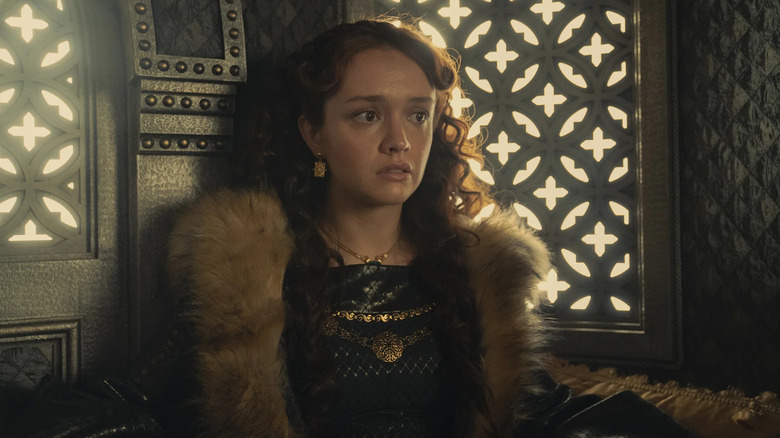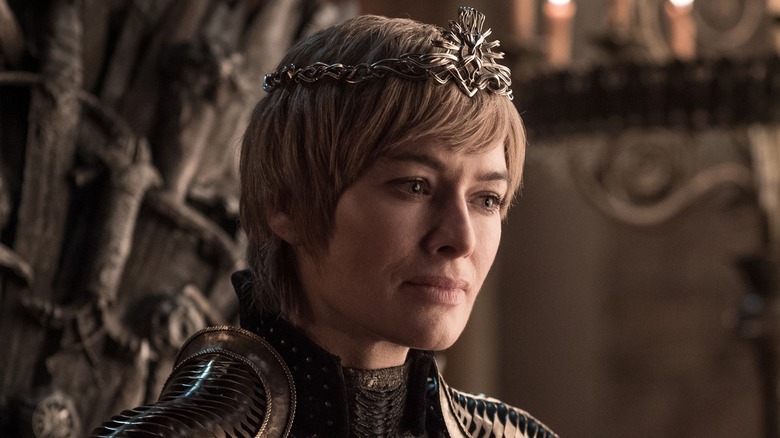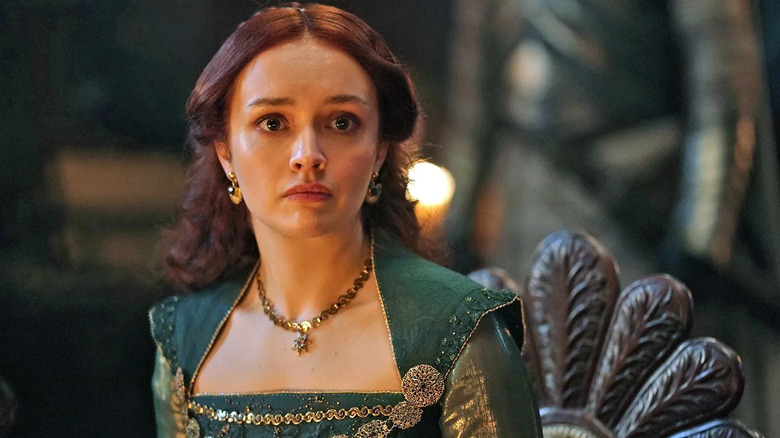
"House of the Dragon" is doomed to be constantly measured up against "Game of Thrones" for its entire existence. The prequel series will have to endure the weight of massive expectations, both to live up to and avoid the pitfalls of its predecessor. Because these shows are forever linked, folks on the internet are inevitably going to end up making comparisons to the characters. Any character who's awful will be "the new Joffrey" and any silver-haired Targaryen girl is bound to get called "the new Daenerys." These associations are often simplistic, but people love making them!
One of the comparisons we're seeing thrown around the most on the internet is comparisons between Cersei Lannister and Alicent Hightower. Cersei Lannister was one of the breakout characters of "Game of Thrones," a menacing villain played brilliantly by Lena Headey, even if in the final few seasons all she did was look out a window with a smug look and a cup of wine. With Alicent Hightower seemingly taking up the mantle of "main matriarchal antagonist" in the new series, the comparisons between the two are easy to make. Even we here at /Film have done so, it's so hard to resist!
These comparisons can be reductive, though, and Alicent's actor seems to agree with me. Olivia Cooke, who put in a great performance as the conflicted and anxiety-riddled queen in the first season of "House of the Dragon," spoke in a Variety interview about how she feels about these comparisons to Cersei Lannister.
Not The Same At All

According to Cooke in the Variety piece, these comparisons are inevitable due to the nature of the internet.
"They'll always be compared. In online discourse, it tends to be more black and white of who's the hero and the villain. I do think they're really different, though, and I limited the amount of wine that I drank in scenes because I didn't want the comparison to be too transparent."
Cooke is aware of the comparisons and actively trying to steer away from them. Just like the show itself, which will need to work extra hard to avoid being pegged as just "more 'Game of Thrones,'" Cooke needs to rise above and beyond with her characterization of Alicent if she wants people to give her performance the credit it deserves. One of the challenges of making a prequel to such a popular show, I suppose.
And while Cooke admires the work of Headey on the Cersei character, she sees the differences between their two roles as very clear.
"I think Alicent is run on anxiety and self-doubt a lot more, and I don't think Cersei has that at all. She completely believes in every blow she strikes. I don't think Alicent has that at all. She's been so beaten by the patriarchal system she's in, by her children, by trying to endlessly make things right and to walk such a narrow, straight line. She's put herself under such immense pressure. You can see Alicent fraying at the seams the whole time, whereas Cersei is so strong and formidable all the way through."
Not A Villain

I think that Cooke's analysis here is pretty spot-on. Both characters are primarily motivated by their being mothers and wanting to protect their children. Even so, the ways in which they go about attempting to keep their children safe are completely different.
Cersei Lannister is far crueler than Alicent. Cersei was willing and happy to do anything and kill anybody to protect her children. Cersei was always confident in her decisions, no matter how horrific her acts or how foolish they actually were.
Alicent has nowhere near that self-assurance. Alicent loves and wants to protect her children but is always unsure of the methods she must use to do so. She's extremely resistant to the idea of killing Rhaenyra and her children to secure Aegon's claim to the throne, and she only seems to be willing to mobilize Aegon's coup because the alternate choice is leaving her children at Rhaenyra's mercy. She's motivated by fear and often lacks the stomach for what she must do.
In a Deadline interview, Cooke talks about how she doesn't see Alicent as a villain.
"I never played her as a villain. I know she makes morally questionable decisions and her reactions can be quite uncouth, to say the least. But I have to believe in what she does in order to play her with absolute honesty and truth. I really have to empathize with Alicent and know that she's coming from a place of undying love and protection for her children."
Once again, Cooke's right. Alicent isn't just a cartoonish villain, like Cersei would often be. She's a complex and tragic character, a mother who's gone too far to protect the children she loves. And that creates a completely different intrigue.
Read this next: 13 Box Office Bombs That Are Truly Worth A Watch
The post How House of the Dragon Star Olivia Cooke Worked to Avoid Cersei Comparisons appeared first on /Film.
0 Comments